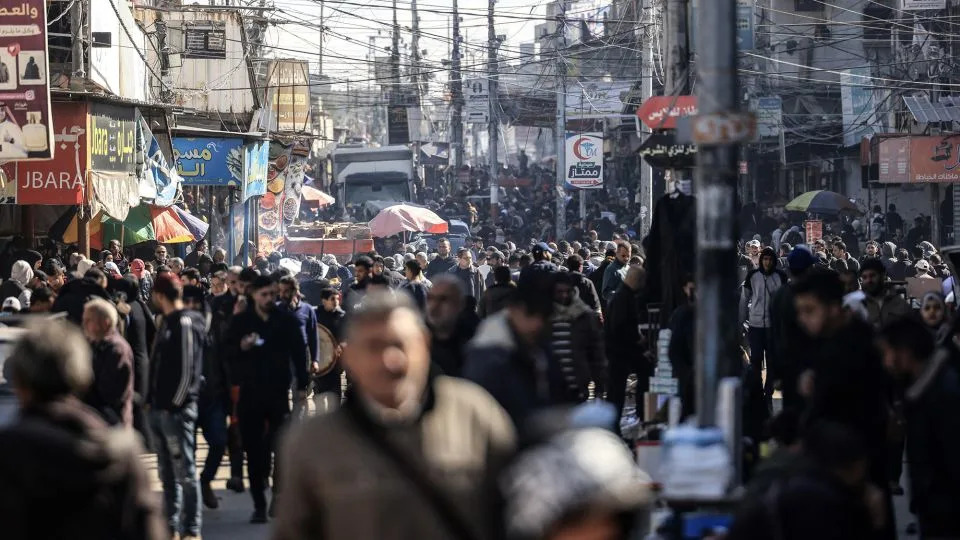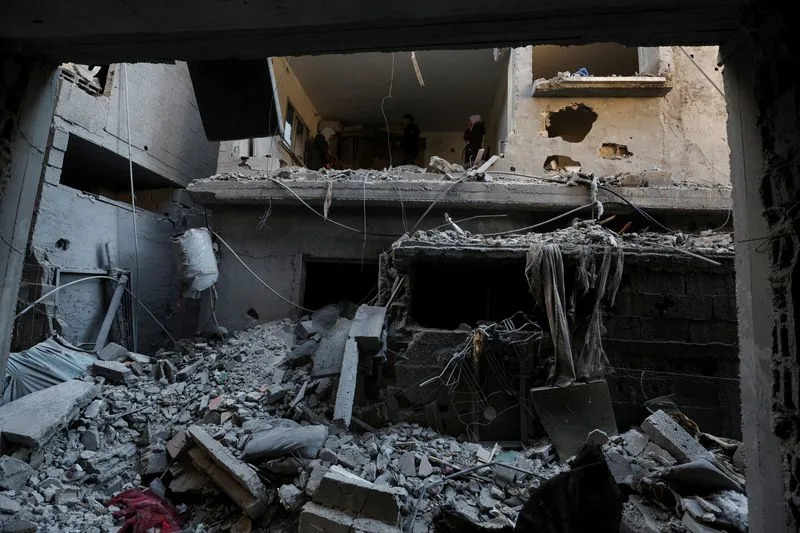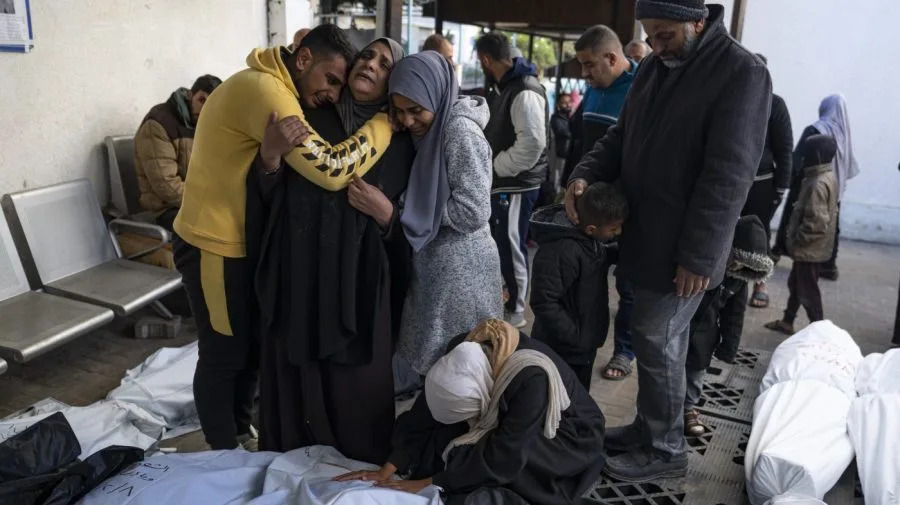Israel prepares assault on Rafah, seeks to allay fears of 'bloodbath'

Israeli forces geared up on Friday for a ground assault on Hamas in the southern Gaza city of Rafah, where hundreds of thousands of people displaced by violence further north are trapped in desperate conditions.
Prime Minister Benjamin Netanyahu's office said the military had been told to come up with a plan to evacuate civilians but aid agencies warned that a military offensive in such a densely populated area could end up killing large numbers of innocent people.
"There is a sense of growing anxiety, growing panic in Rafah because basically people have no idea where to go," said Philippe Lazzarini, the head of the U.N. Palestinian refugee agency UNRWA.
U.S. President Joe Biden said on Thursday Israel's response to the Oct. 7 attacks by Hamas militants was "over the top" and Washington said it would not support any military operation mounted in Rafah without due consideration for civilians.
More than a million people driven southwards by four months of Israeli bombing of Gaza are packed into Rafah and surrounding areas on the coastal enclave's border with Egypt, which has reinforced the frontier, fearing an exodus.
Netanyahu's office said four Hamas battalions were in Rafah and Israel could not achieve its goal of eliminating the Islamist militants while they remained there. Civilians should be evacuated from the combat zone, it said.
"Therefore, Prime Minister Benjamin Netanyahu has ordered the IDF (Israel Defence Forces) and the security establishment to submit to the Cabinet a combined plan for evacuating the population and destroying the battalions."
The statement, issued two days after Netanyahu rejected a Hamas ceasefire proposal that also envisaged the release of hostages held by the Palestinian militant group, gave no further details.
Tal Heinrich, a spokesman for Netanyahu, told Fox News that "if Israel's hands are tied by the international community, or if we take the pressure for Hamas actions" it would be "an open invitation for more terrorism worldwide."
The United Nations said Palestinian civilians in Rafah needed to be protected, but there should not be any forced mass displacement, which it said went against international law.
"We're extremely worried about the fate of civilians in Rafah," U.N. spokesman Stephane Dujarric said.
'IT CROSSES ALL RED LINES', SAYS PALESTINIAN PRESIDENT
The Palestinian Presidency said what it described as Netanyahu's plans for a military escalation in Rafah aimed to displace the Palestinian people from their land.
"Taking this step threatens security and peace in the region and the world. It crosses all red lines," said the office of Mahmoud Abbas, head of the Palestinian Authority that exerts partial self-rule in the Israeli occupied West Bank.
An Israeli official who declined to be named said that Israel would try to organise for people in Rafah, most of whom fled there from the north, to be moved back northwards within Gaza ahead of any military operation there.
Israeli forces have shifted their offensive southwards towards Rafah after initially storming northern Gaza in response to the Oct. 7 rampage in southern Israel by Hamas gunmen who rule the coastal strip.
Doctors and aid workers in Rafah are struggling to supply even basic aid to those sheltering there, many of them penned up against the border fence with Egypt and living in makeshift tents.
"No war can be allowed in a gigantic refugee camp," said Jan Egeland, Secretary-General of the Norwegian Refugee Council, warning of a "bloodbath" if Israeli operations expand there.
In a post on the social media platform X, Canadian Foreign Minister Melanie Joly said an Israeli assault on Rafah would put the lives of Palestinians and foreign nationals, including Canadians "in grave danger" and hamper vital aid deliveries.
GAZAN CHILDREN ACUTELY MALNOURISHED
Gaza's health ministry said at least 27,947 Palestinians had been confirmed killed in the conflict, 107 of them in the previous 24 hours, and 67,459 injured.
It has said many more could be buried under rubble from Israeli attacks since Hamas militants killed 1,200 people and took 253 hostages in the Oct. 7 attack, according to Israeli tallies.
Almost one in 10 of Gazans under five are now acutely malnourished, according to initial U.N. data from arm measurements that show physical wasting.
The charity ActionAid said some Gazans were eating grass.
"Every single person in Gaza is now hungry, and people have just 1.5 to 2 litres of unsafe water per day to meet all their needs," it said.
Hours before Netanyahu's statement, Israeli warplanes carried out new sorties in which Palestinian health officials said at least 15 people had been killed, eight of them in the Rafah area.
"We were sleeping inside and, when the strike hit, were thrown outside. After that, another rocket hit," said Mohammed al-Nahal, an elderly Palestinian standing beside the rubble of a building that had been hit.
"It destroyed the entire home. My daughter was killed. My daughter, her husband, her son, all were martyred."
BIDEN CRITICISES ISRAEL
Israel's military said its forces had been in action in the area of Khan Younis and in northern and central Gaza to eliminate militant cells and destroy militant infrastructure.
It says it takes steps to avoid civilian casualties and accuses Hamas militants of hiding among civilians, including at schools, shelters and hospitals. Hamas has denied doing so.
Biden said on Thursday he had been pushing for a deal to pause fighting to allow the release of hostages, increase the amount of humanitarian aid reaching Palestinian civilians, and normalise relations between Israel and Saudi Arabia.
Hamas this week proposed a ceasefire of 4-1/2 months, during which remaining hostages would go free, Israel would withdraw its troops and agreement would be reached on an end to the war.
Netanyahu said Hamas' terms, offered in response to a proposal drawn up by U.S. and Israeli spy chiefs with Qatar and Egypt, were "delusional" and vowed to fight on.
A Hamas official told Reuters on Friday that a delegation from the group had concluded talks with mediators in Cairo and was now waiting for the official Israeli response to its proposal.
Netanyahu orders Rafah evacuation ahead of expected invasion
Israel Prime Minister Benjamin Netanyahu ordered the military to prepare for civilian evacuations in Rafah on Friday as his troops are set to enter the densely populated city that now serves as the largest refugee camp for Palestinians fleeing the war between Israel and Palestinian militant group Hamas.
Netanyahu said in a statement shared by his office that he ordered Israel’s military and the security establishment to submit a plan to evacuate the population in the southern Gaza Strip city before entering the refugee camp to fight Hamas.
“It is impossible to achieve the goal of the war without eliminating Hamas, and by leaving four Hamas battalions in Rafah,” Netanyahu said in a statement. “On the contrary, it is clear that intense activity in Rafah requires that civilians evacuate the areas of combat.”
Israel threatened to move into Rafah last week. Israel Defense Minister Yoav Gallant said the advance would come now that forces had completed operations in the southern city of Khan Yunis.
Rafah, situated at the border with Egypt, is the last designated safe zone in Gaza, with Israeli troops having fought across almost the entire Gaza Strip.
About 1.5 million displaced Palestinians are at the refugee camp, which also serves as the main hub for humanitarian aid entering the territory to help besieged civilians who are struggling to access the basic necessities of food, water and medical aid.
The Israeli push into Gaza is likely to frustrate the Biden administration, which is trying to get Israel to reduce casualties in the coastal enclave. More than 27,000 Palestinians have died in the war, according to Hamas health officials, who say most of the dead are women and children.
President Biden delivered his most disapproving remarks yet on the war when he said the military action in Gaza was “over the top” during a Thursday night appearance at the White House.
State Department spokesperson Vedant Patel said Thursday that a move into Rafah “is not something that we’d support.”
To “conduct such an operation right now with no planning and little thought in an area where there is sheltering of a million people would be a disaster,” Patel told reporters.
Mike Merryman-Lotze, who works for the Quaker humanitarian organization American Friends Service Committee, which has personnel on the ground to assist Palestinian civilians, said invading Rafah “will only cause more death and suffering.”
“Almost the entire population of Gaza has been squeezed up against the border in Rafah and now has nowhere left to flee,” Merryman-Lotze said in a statement. “This invasion comes as people in Gaza are dying from starvation, thirst, exposure, and the destruction and obstruction of access to health care.”
UNICEF Executive Director Catherine Russell said more than 600,000 children are in Rafah, urging Israel to not move into the area.
“Thousands more could die in the violence or by lack of essential services, and further disruption of humanitarian assistance,” Russell said in a statement. “We need Gaza’s last remaining hospitals, shelters, markets and water systems to stay functional. Without them, hunger and disease will skyrocket, taking more child lives.”
But Israel is vowing to destroy Hamas in retaliation for its Oct. 7 attack that killed about 1,200 Israelis, along with the taking of some 240 hostages, more than 100 of whom are still in Gaza.
Netanyahu has rejected the latest negotiations to free those hostages after Hamas pressed for a cease-fire in return for their freedom, and the Israeli leader is set on the complete defeat of the militant group, including finding and killing Palestinian leaders responsible for the October attacks.
Israel has said its war aim includes hunting Hamas in every corner of Gaza, and it has accused the militants of hiding behind civilians.
Netanyahu directs Israeli military to draw up plan to evacuate more than one million people from Rafah as offensive looms

Israeli Prime Minister Benjamin Netanyahu has directed the country’s military to plan for the “evacuation of the population” from Rafah, his office said in a statement on Friday, ahead of an anticipated ground assault on the southern Gaza city.
More than 1.3 million people are believed to be in Rafah, the majority displaced from other parts of Gaza, according to the United Nations.
Netanyahu on Thursday said that the Israel Defense Forces (IDF) would “soon go into Rafah, Hamas’s last bastion.”
Many Palestinians have trekked through the enclave and taken refuge in the city as the IDF’s campaign has moved south through Gaza.
But it is unclear where next they could go; the city borders Egypt to the south, but the border into the country has been closed for months.
In the statement, the Israeli Prime Minister’s Office said that it was not possible to both eliminate Hamas and leave “four Hamas battalions in Rafah.”
“On the other hand, it is clear that a massive operation in Rafah requires the evacuation of the civilian population from the combat zones.”
“That is why the Prime Minister directed the IDF and the defense establishment to bring to the Cabinet a dual plan for both the evacuation of the population and the disbanding of the battalions.”
Rafah is the last major population center in Gaza not occupied by the IDF.
It has rapidly become home to a huge population of displaced Palestinians. Satellite images showed this week how a tent city in Rafah has swelled in size in just a few weeks, as more Gazans descend on the area to escape the IDF’s campaign.
In a statement Friday, the office of Palestinian Authority President Mahmoud Abbas condemned the plan for military escalation and called a potential evacuation a “real threat” and “dangerous prelude” to the Israeli displacement of Palestinian people from their land.
“The time has come for everyone to bear their responsibility in the face of creating another catastrophe that will push the entire region into endless wars,” the statement said.
Palestinians in Rafah told CNN they are afraid and have nowhere else to go if Israel were to enter the city.
“We are praying to God that what happened in Gaza City does not happen in Rafah because if the same happens in Rafah we will have no place to go,” Mohammad Jamal Abu Tour said.
“If we go to Gaza City or Khan Younis or El Nuseirat we are not going to find the supplies that were provided for us here in Rafah,” he added. “We keep hearing that in Gaza City they can’t find clean water and that they are eating grass, they drink from the sea, God help them.”
Mahmoud Khalil Amer, who was displaced from the Al Shati refugee camp in northern Gaza, said he stayed in a tent near a cemetery in Rafah. “We are not living, the dead are better than us,” he said.
The top commander in charge of Israel’s military operation in southern Gaza told CNN on Sunday that there was no plan in place yet for how to minimize civilian deaths in the city. Brig. Gen. Dan Goldfuss, who oversees the IDF’s 98th Division, said that he would work on such a plan “if and when” he receives the order to maneuver his forces into the area, and that as of Sunday, the order had not been issued yet.
A spokesperson for the United States State Department said Thursday that the US would not support an Israeli military operation in Rafah “without serious planning.”
“To conduct such an operation right now with no planning and little thought in an area where there is sheltering of a million people would be a disaster,” Deputy State Department Spokesperson Vedant Patel said at a press briefing Thursday.
Later on Thursday, President Joe Biden offered one of his sharpest rebukes to date of Israel’s military conduct saying the operation to go after Hamas had been “over the top.”
“I’m of the view, as you know, that the conduct of the response in Gaza – in the Gaza Strip – has been over the top,” Biden told reporters at the White House, describing his own efforts to open up Gaza so more humanitarian aid could flow in.
“I’ve been pushing really hard – really hard – to get humanitarian assistance into Gaza. A lot of innocent people are starving. A lot innocent people in trouble and dying. And it’s got to stop,” Biden said.
UN spokesperson Stéphane Dujarric said Friday that the organization was “extremely worried about the fate of civilians in Rafah” adding that the unprecedented density of Rafah’s population makes it nearly impossible to protect civilians in the event of ground attacks.
Speaking at his daily news briefing in New York, Dujarric said people “need to be protected,” but added, the UN also “does not want to see any forced mass displacement of people, which is by definition against their will.”
The Norwegian Refugee Council (NRC) meanwhile said in a press release Thursday that Rafah could soon turn “into a zone of bloodshed and destruction that people won’t be able to escape.”
- Questions and Answers
- Opinion
- Story/Motivational/Inspiring
- Technology
- Art
- Causes
- Crafts
- Dance
- Drinks
- Film/Movie
- Fitness
- Food
- Παιχνίδια
- Gardening
- Health
- Κεντρική Σελίδα
- Literature
- Music
- Networking
- άλλο
- Party
- Religion
- Shopping
- Sports
- Theater
- Wellness
- News
- Culture
- War machines and policy



